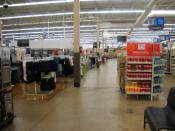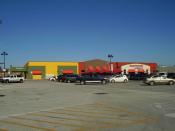When analyzing the positive and negative effects of sprawl in my life, I was first inclined to write a mostly negative response. However, after researching sprawl and more specifically, urban planning and public policy, my opinions began to shift. I clearly stated shift, and not change. I still feel that the opening up of a Home Depot in a small rural town can be adverse for the local residents in the sense that it can put local mom and pop stores out of business. Also, it is perturbing to see my hometown in New Jersey becoming more and more congested, as housing development after housing development, and strip mall after strip mall seem to appear almost weekly, some of which remain vacant for months. However, citing this type of development as "sprawl" trivializes a problem that is much, much, more complex.
There are wonderful cases around the country of the community working with the government, which they should do, to save the natural land they live on.
The problem with the fight against sprawl is that it takes a skewed, and sometimes selfish, perspective on the real issues. You can look at the viewpoint of many of these activists by visiting websites such as "www.sprawl-busters.com". On this site, you can see several examples of community action against urban development. The residents of these communities refuse to innovate and appear to target Wal-Mart as the source of the supposed degradation of their hometown. In fact, targeting Wal-Mart is a very blind and unfair action. The case against sprawl is made by citing that sprawl destroys the environment by increasing pollution and destroying open space. In actuality, Wal-Mart contributes millions of dollars, annually, in grants to environmental agencies and programs. In addition, Wal-Mart is creating environmentally friendly innovations for its own stores...


